
Nepenthes mirabilis, or the common swamp pitcher-plant and tropical pitcher plant, is a carnivorous plant species. By far the most widespread of all Nepenthes, its range covers continental Southeast Asia and all major islands of the Malay Archipelago, stretching from China in the north to Australia in the south. The species exhibits great variability throughout its range. One of the more notable varieties, N. mirabilis var. echinostoma, is endemic to Brunei and Sarawak and possesses an extremely wide peristome.

Pomaderris is a genus of about 80 species of flowering plants in the family Rhamnaceae, the species native to Australia and/or New Zealand. Plants in the genus Pomaderris are usually shrubs, sometimes small trees with simple leaves arranged alternately along the branches and bisexual, woolly-hairy flowers arranged in racemes or panicles. The flowers are usually yellow and often lack petals.
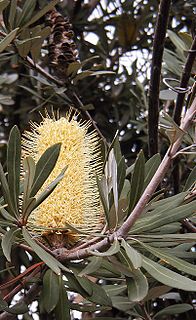
Banksia integrifolia subsp. integrifolia is a subspecies of Banksia integrifolia.
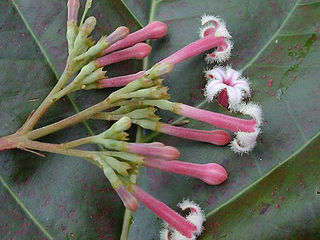
Cinchona pubescens, also known as red cinchona and quina (Kina), is native to Central and South America. It is known as a medicinal plant for its bark's high quinine content- and has similar uses to Cinchona officinalis in the production of quinine, most famously used for treatment of malaria.

Maireana is a genus of around 57 species of perennial shrubs and herbs in the family Amaranthaceae which are endemic to Australia. Species in this genus were formerly classified within the genus Kochia. The genus was described in 1840 by the botanist, Moquin-Tandon and named to honour Joseph François Maire (1780-1867), an amateur botanist who befriended him during the author's first visit to Paris in 1834.
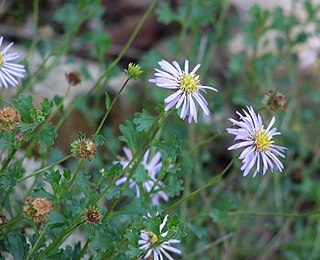
Calotis is a genus of herbs or small shrubs in the daisy family Asteraceae. Most of the species are native to Australia, while two occur in Asia.

Amyema quandang is a species of hemi-parasitic shrub which is widespread throughout the mainland of Australia, especially arid inland regions, sometimes referred to as the grey mistletoe.
Ophiuros is a genus of Asia, Australian, and East African plants in the grass family.

Asteridea is a genus of flowering plants in the family Asteraceae. Evidence suggests that the genus, Asteridea, is monophyletic.
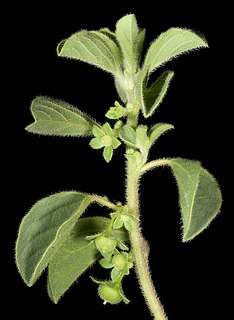
Notoleptopus is a monotypic genus of flowering plants in the family Phyllanthaceae. It is one of eight genera in the tribe Poranthereae. The sole species is Notoleptopus decaisnei. It is a monoecious shrub, native to Australia, New Guinea, and Indonesia.

Acacia pubescens, also known as the downy wattle, is a species of wattle found in the Sydney Basin in eastern New South Wales. The downy wattle is classified as vulnerable; much of its habitat has vanished with the growth of the city of Sydney.
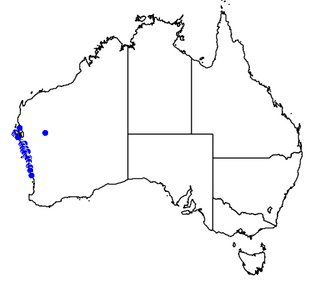
Commersonia borealis is a species of Malvaceae native to Western Australia

Meeboldina is a plant genus in the family Restionaceae, described as a genus in 1943. It is named for the botanical collector Alfred Meebold.

Neustanthus is a monotypic genus of flowering plants belonging to the pea family Fabaceae and its tribe Phaseoleae. The only species is Neustanthus phaseoloides, called tropical kudzu. This species is a forage crop and cover crop used in the tropics. It is known as puero in Australia and tropical kudzu in most tropical regions.
Cyperus viscidulus is a sedge of the family Cyperaceae that is native to north western Australia.
John Alan (Jack) Elix emeritus professor in chemistry at the Australian National University, is an organic chemist who has contributed in many fields: lichenology, lichen chemotaxonomy, plant physiology and biodiversity and natural product chemistry. He has authored 2282 species names, and 67 genera in the field of mycology.
Neville Grant Walsh has worked at the National Herbarium of Victoria from 1977.

Olearia paucidentata is a plant in the Asteraceae family. It was first described as Eurybia paucidentata in 1845 by Joachim Steetz. In 1867, George Bentham assigned it to the genus Olearia in his Flora Australiensis.

Nicotiana rustica is a plant in the family Solanaceae, native to Western Australia, South Australia and the Northern Territory.














